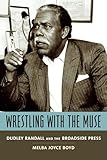Wrestling with the Muse : Dudley Randall and the Broadside Press / Melba Joyce Boyd.
Material type: TextPublisher: New York, NY : Columbia University Press, [2004]Copyright date: ©2004Description: 1 online resource (368 p.) : 37 photosContent type:
TextPublisher: New York, NY : Columbia University Press, [2004]Copyright date: ©2004Description: 1 online resource (368 p.) : 37 photosContent type: - 9780231130264
- 9780231503648
- African American arts -- Michigan -- Detroit
- American literature -- African American authors -- Publishing -- Michigan -- Detroit
- Literature publishing -- Michigan -- Detroit -- History -- 20th century
- Publishers and publishing -- United States -- Biography
- LITERARY CRITICISM / American / African-American
- 811/.54 B 22
- PS3568.A49 Z58 2003eb
- online - DeGruyter
- Issued also in print.
| Item type | Current library | Call number | URL | Status | Notes | Barcode | |
|---|---|---|---|---|---|---|---|
 eBook
eBook
|
Biblioteca "Angelicum" Pont. Univ. S.Tommaso d'Aquino Nuvola online | online - DeGruyter (Browse shelf(Opens below)) | Online access | Not for loan (Accesso limitato) | Accesso per gli utenti autorizzati / Access for authorized users | (dgr)9780231503648 |
Frontmatter -- Contents -- List of Illustrations -- Acknowledgments -- Introduction. Wrestling with the Muse -- 1. Beginnings and Endings -- 2. The Fertile Black Bottom of Paradise Valley -- 3. Poets of Black Bottom: Dudley Randall Meets Robert Hayden -- 4. War at Home and Abroad -- 5. The Return: Poetry and Prophecy -- 6. Sojourn and Return -- 7. The Emergence of the Second Renaissance in Detroit -- 8. "Ballad of Birmingham": The Founding of Broadside Press and the Black Arts Movement -- 9. "Ya Vas Lyubil": Alexander Pushkin, Dudley Randall, and the Black Russian Connection -- 10. Cultural Wars and Civil Wars -- 11. "Prophets for a New Day": Diversity and Heritage -- 12. The New Black Poets -- 13. Dudley Randall's Poetic Dialectics and the Black Arts Movement -- 14. "After the Killing": Dudley Randall's Black Arts Poetry -- 15. Poetry as Industry -- 16. "Shape of the Invisible": The Rise and Fall of Broadside Press -- 17. "In the Mourning Time": The Return -- 18. A Poet Is Not a Jukebox -- 19. At Peace with the Muse -- 20. "The Ascent" -- Epilogue -- Appendix I: Translating Poetry into Film: The Black Unicorn: Dudley Randall and the Broadside Press -- Appendix II: Worksheets for "Frederick Douglass and the Slave Breaker" -- Notes -- Bibliography -- Index -- Backmatter
restricted access online access with authorization star
http://purl.org/coar/access_right/c_16ec
And as I groped in darkness and felt the pain of millions,gradually, like day driving night across the continent,I saw dawn upon them like the sun a vision.-Dudley Randall, from "Roses and Revolutions"In 1963, the African American poet Dudley Randall (1914-2000) wrote "The Ballad of Birmingham" in response to the bombing of a church in Alabama that killed four young black girls, and "Dressed All in Pink," about the assassination of President Kennedy. When both were set to music by folk singer Jerry Moore in 1965, Randall published them as broadsides. Thus was born the Broadside Press, whose popular chapbooks opened the canon of American literature to the works of African American writers. Dudley Randall, one of the great success stories of American small-press history, was also poet laureate of Detroit, a civil-rights activist, and a force in the Black Arts Movement. Melba Joyce Boyd was an editor at Broadside, was Randall's friend and colleague for twenty-eight years, and became his authorized biographer. Her book is an account of the interconnections between urban and labor politics in Detroit and the broader struggles of black America before and during the Civil Rights era. But also, through Randall's poetry and sixteen years of interviews, the narrative is a multipart dialogue between poets, Randall, the author, and the history of American letters itself, and it affords unique insights into the life and work of this crucial figure.
Issued also in print.
Mode of access: Internet via World Wide Web.
In English.
Description based on online resource; title from PDF title page (publisher's Web site, viewed 02. Mrz 2022)


